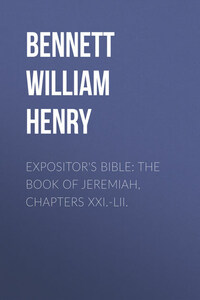CHAPTER I
INTRODUCTORY:2JEHOAHAZ
xxii. 10-12
"Weep ye not for the dead, neither bemoan him: but weep sore for him that goeth away: for he shall return no more." – Jer. xxii. 10
As the prophecies of Jeremiah are not arranged in the order in which they were delivered, there is no absolute chronological division between the first twenty chapters and those which follow. For the most part, however, chapters xxi. – lii. fall in or after the fourth year of Jehoiakim (b. c. 605). We will therefore briefly consider the situation at Jerusalem in this crisis. The period immediately preceding b. c. 605 somewhat resembles the era of the dissolution of the Roman Empire or of the Wars of the French Revolution. An old-established international system was breaking in pieces, and men were quite uncertain what form the new order would take. For centuries the futile assaults of the Pharaohs had only served to illustrate the stability of the Assyrian supremacy in Western Asia. Then in the last two decades of the seventh century b. c. the Assyrian Empire collapsed, like the Roman Empire under Honorius and his successors. It was as if by some swift succession of disasters modern France or Germany were to become suddenly and permanently annihilated as a military power. For the moment, all the traditions and principles of European statesmanship would lose their meaning, and the shrewdest diplomatist would be entirely at fault. Men's reason would totter, their minds would lose their balance at the stupendous spectacle of so unparalleled a catastrophe. The wildest hopes would alternate with the extremity of fear; everything would seem possible to the conqueror.
Such was the situation in b. c. 605, to which our first great group of prophecies belongs. Two oppressors of Israel – Assyria and Egypt – had been struck down in rapid succession. When Nebuchadnezzar3 was suddenly recalled to Babylon by the death of his father, the Jews would readily imagine that the Divine judgment had fallen upon Chaldea and its king. Sanguine prophets announced that Jehovah was about to deliver His people from all foreign dominion, and establish the supremacy of the Kingdom of God. Court and people would be equally possessed with patriotic hope and enthusiasm. Jehoiakim, it is true, was a nominee of Pharaoh Necho; but his gratitude would be far too slight to override the hopes and aspirations natural to a Prince of the House of David.
In Hezekiah's time, there had been an Egyptian and an Assyrian party at the court of Judah; the recent supremacy of Egypt had probably increased the number of her partisans. Assyria had disappeared, but her former adherents would retain their antipathy to Egypt, and their personal feuds with Jews of the opposite faction; they were as tools lying ready to any hand that cared to use them. When Babylon succeeded Assyria in the overlordship of Asia, she doubtless inherited the allegiance of the anti-Egyptian party in the various Syrian states. Jeremiah, like Isaiah, steadily opposed any dependence upon Egypt; it was probably by his advice that Josiah undertook his ill-fated expedition against Pharaoh Necho. The partisans of Egypt would be the prophet's enemies; and though Jeremiah never became a mere dependent and agent of Nebuchadnezzar, yet the friends of Babylon would be his friends, if only because her enemies were his enemies.
We are told in 2 Kings xxiii. 37 that Jehoiakim did evil in the sight of Jehovah according to all that his father had done. Whatever other sins may be implied by this condemnation, we certainly learn that the king favoured a corrupt form of the religion of Jehovah in opposition to the purer teaching which Jeremiah inherited from Isaiah.
When we turn to Jeremiah himself, the date "the fourth year of Jehoiakim" reminds us that by this time the prophet could look back upon a long and sad experience; he had been called in the thirteenth year of Josiah, some twenty-four years before. With what sometimes seems to our limited intelligence the strange irony of Providence, this lover of peace and quietness was called to deliver a message of ruin and condemnation, a message that could not fail to be extremely offensive to most of his hearers, and to make him the object of bitter hostility.








